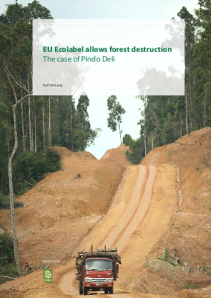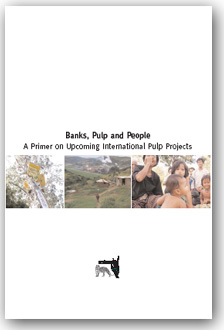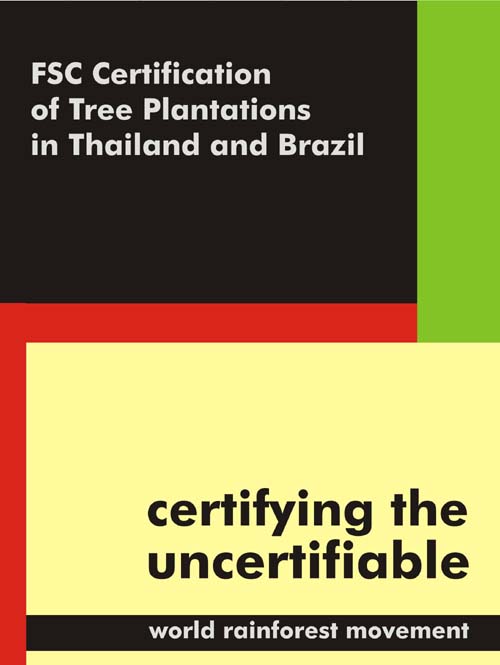One World Trust’s “Global Accountability Report” looks only at policies and not at what the organisations analysed do in practice.
By Chris Lang. Published in Bankwatch, December 2007.
In its more than 40 years of existence, the Asian Development Bank has financed projects that have dammed rivers, bulldozed forests, pumped pollution into the air and rivers and evicted Indigenous Peoples and local communities. Since 1994, 1.77 million people have been evicted from their homes to make way for ADB-financed projects. The Bank is fundamentally unaccountable to the people affected by its projects.
Yet in its 2007 “Global Accountability Report”, the UK-based NGO One World Trust gave the ADB an accountability score of 81 per cent, ranking the Bank ADB second out of the 30 organisations studied. “Independent Report Gives ADB High Marks for Accountability,” gushes the ADB’s press release. ADB Vice-President C. Lawrence Greenwood Jr. describes One World Trust’s report as a “useful tool that can help ADB measure its effectiveness as a development institution in promoting transparency and other dimensions of accountability through its policies and work.”
One World Trust’s report only looks at policies on paper. “Inevitably,” states the report, “variation between policy commitments made by an organisation and what happens in practice on the ground may occur.” One World Trust makes no attempt to address this problem. “The study therefore does not claim to offer a full and definitive assessment of an organisation’s accountability.”
The ADB’s press release is in breach of its own Public Communications Policy which states that “ADB has a responsibility to provide the public with a clear, balanced picture of its work.” A balanced picture would include reference to the thousands of people whose livelihoods have been destroyed by the Bank’s projects and to whom the Bank is a remote, non-transparent, unaccountable organisation.
One of the problems with One World Trust’s report is that it is a desk study. The researchers did not get in contact with anyone directly affected by the ADB’s projects. But that isn’t the only problem. The report looks at 30 organisations: ten intergovernmental organisations, ten NGOs and ten corporations. Google is the least transparent organisation of the the 30 studied, with an overall score of 17 per cent. ADB scored 81 per cent. Attempting to compare the ADB to Google is meaningless. While there are serious concerns regarding privacy and Google’s storage of information, as well as concerns about its pandering to notoriously undemocratic regimes such as China, it has not funded projects which evicted villagers, bulldozed forests or dammed rivers.
Another problem is that the One World Trust report only looks at accountability. Among the other companies in the 2007 report are Suez, DynCorp, General Electric Company, GlaxoSmithKline, Petrobras, HSBC Holdings, TATA Group, Coca-Cola and Interpol. DynCorp’s record of aerial spraying of lethal herbicides on coca crops and neighbouring communities in Columbia is ignored, as are reports that the US government cannot account for the billion dollars that it gave to DynCorp to provide training services in Iraq. One World Trust makes no mention of the accusations against a Coca-Cola bottling plant (47 per cent owned by Coca-Cola) in Colombia of hiring paramilitaries to kill, kidnap,torture and disappear trade unionists working for the bottling plant. Or the water depletion and drought linked to a Coca-Cola factory in India. There is no mention Suez’s role in privatising water supply in El Alto, Bolivia, which failed after massive protests by local people. Instead, the report describes Suez as a “TNC designing solutions for the management and provision of energy, water, sanitation and waste utilities”. Coca-Cola is a “TNC engaged in the manufacture and sale of beverages,” and DynCorp is a “TNC providing training, logistical and operational support to military and civilian government institutions.”
Similarly, One World Trust’s report makes no mention of problems with any ADB projects. To One World Trust, ADB is simply a “Multilateral development bank promoting economic and social progress in Asia.” Had One World Trust’s researchers looked at some of the Bank’s actual projects they may have come up with a more accurate description. Case studies documenting the 42,000 people with severe respiratory problems living near the ADB-funded Mae Moh lignite-fired power plant in Thailand, or the tens of thousands of people who have protested against the proposed Phulbari coal mine in Bangladesh would have revealed another side of the ADB. A case study of the Theun Hinboun dam in Laos would have revealed the failure of the ADB to address the destruction of local communities’ fisheries and riverbank vegetable gardens. Case studies of other projects, such as the the Samut Prakarn Wastewater Management Project in Thailand, would have revealed problems of corruption and lack of transparency associated with Bank projects.
This is the fourth report in One World Trust’s “Global Accountability Project”. Reports from previous years have promising sounding titles: “Power without Accountability?”, “Pathways to Accountability”, and “Holding Power to Account”. One World Trust uses a Global Accountability Framework to compare the accountability policies of the various organisations. Drawn up over a five years period involving extensive consultation with stakeholders, the Framework includes four dimensions: transparency, participation, evaluation and complaint and response mechanisms. “Within each dimension, an organisation’s capabilities are measured by assessing the existence of key accountability values and principles in policy commitments and supporting management systems,” explains One World Trust in its report.
It sounds great, doesn’t it? Well, sort of. “How do we hold these organisations to account for their actions?” asks One World Trust. Certainly not by ignoring the organisations’ track records.
One World Trust defines accountability as “the process through which an organisation makes a commitment to respond to and balance the needs of stakeholders in its decision making processes and activities, and delivers against that commitment.” An organisation may have a series of beautiful sounding accountability policies and procedures in place. It may have an “NGO Centre” and a “Public Information and Disclosure Unit”. But One World Trust does not look at whether the organisation is accountable in practice. It does not look at the experience of NGOs or local people in trying to access information, or whether the organisation can be held to account when the organisation tramples on the rights of local communities or workers, or when its activities result in major environmental damage. One World Trust cannot say whether any organisation “delivers against” its “commitment”.
One World Trust assumes that accountability policies on paper “reflect an already existing organisation-wide commitment to the issue, or [are] an indication that the headquarters / international secretariat recognises that these stated values and principles should be applied throughout the organisation as a matter of good practice.” One World Trust fails to look at the incentives for staff within the organisation to apply accountability policies. ADB staff are rewarded for completing large projects and getting large sums of money out of the Bank. They are not rewarded for upholding local communities’ rights to stop unwanted projects on their forests and farmlands. Without incentives for staff to apply policies, they are meaningless. Instead, One World Trust assumes that if the policies are in place, Bank staff will apply them: “Equipped with relevant accountability policies and systems, an organisation has the internal capabilities to implement these principles and values across the wider organisation, network, federation, or group to ensure it is accountable to affected communities and the public at large.”
When looking at the ADB and other intergovernmental organisations, One World Trust does not include “affected communities” in its list of “external stakeholders”. “External stakeholder engagement” refers to how the ADB “cooperates” with NGOs. There is no mention of how the Bank attempts to relate to the people on the receiving end of its projects – local communities, who often do not speak English (the predominant language for Bank reports) and often do not have access to the internet.
“We distrust One World Trust’s findings,” responded the NGO Forum on ADB in a public statement. NGO Forum pointed to the thousands of people evicted to make way for ADB projects and the mismanagement of Bank operations which “has brought suffering to displaced communities and Indigenous Peoples groups as well as degradation to the environment.”
NGO Forum pointed out that the Bank’s Accountability Mechanism has rejected more than 10 complaints at the eligibility stage, most of which on purely technical grounds. The Compliance Review Panel has produced only one report since it was established in 2003. Two other complaints, the Southern Transport Development Project in Sri Lanka and the Chashma Right Bank Project in Pakistan remain unresolved after four years. Communities were evicted without compensation to make way for the Chashma Right Bank Irrigation Project. Design failures have exacerbated floods, villagers have lost drinking water, crops, farmland and access to health facilities. The Chashma communities eventually withdrew their claim to the Bank’s Accountability Mechanism. “It was sheer absence of transparency and manipulation of [the] accountability claim which caused the Chashma claimants to withdraw from their inspection request,” notes Mushtaq Gadi of the Pakistani NGO MAUJ.
One World Trust appears not to understand that giving credit to the ADB simply for having policies on paper effectively undermines local struggles. In response to a letter from Hemantha Withanage of the NGO Forum on the ADB, Robert Lloyd, one of the authors of One World Trust’s report, repeats what he wrote in the report: “[T]here will inevitably be a discrepancy between commitments made in a policy and what happens on the ground.” However, Lloyd writes, “we are confident that we published an objective assessment of the existence and quality of ADB’s accountability policies and systems.”
The history of the ADB’s proposed new forest policy suggests that in fact One World Trust published little more than ADB propaganda. In June 2000, the ADB started work on a new forest policy to replace its 1995 policy. The Bank produced a working paper and held a series of consultations on the working paper. Bank staff then drafted a revised working paper, which was not made available to the public. In June 2003, the Bank posted a new draft version of its forest policy on its website. This draft was rejected by the bank’s board in July 2003. Since then, the proposed forest policy has disappeared into the black box of the ADB’s headquarters in Manila. The Bank posted notes on its website promising a new draft in January 2004, then in July 2004, but no new draft appeared. Bank staff made a series of promises of new drafts, none of which made the light of day. Despite repeated requests for information, the Bank has provided no satisfactory explanation of what discussions have taken place within the Bank over the past four years or even whether the Bank will actually produce a new forest policy.
In February 2007, a new note appeared on the ADB’s website, this time promising that a “synthesis report” would be available in November 2007. Two months later the “synthesis report” is still not available.
The ADB needs a forest policy. It needs a forest policy that provides a safeguard to protect the rights of Indigenous Peoples and local communities living in and near forests. It needs a forest policy that prevents ADB-financed roads, dams and mines from destroying forests and livelihoods. It needs a forest policy that prevents the destruction of forests and commons to make way for industrial tree plantations. It needs a forest policy that prevents the Bank from trading Asia’s forests for carbon emissions in the North. It also needs an open discussion about its forest policy.
On 21 December 2007, I wrote to Javed H. Mir, the ADB’s Senior Natural Resources Specialist (Forestry), to ask for a copy of the “synthesis report”. I asked for an explanation of the process that the Bank intends to follow from now on to develop a new forest policy. I asked why the most recent draft forest policy available on the Bank’s website is dated June 2003. I asked for information about the discussions which had taken place within the Bank about the proposed forest policy. I asked what the Bank’s latest thinking is regarding its proposed new forest policy, and whether the Bank intends to abandon its forest policy and attempt to incorporate forest issues into its ongoing Safeguard Policy Update.
I copied the email to the ADB’s InfoUnit. “Mr. Mir informed us that the draft synthesis report is being revised and is expected to be ready by April 2008,” replied Robert Paul S. Mamonong, the ADB’s Senior Public Information and Disclosure Coordination Assistant. Mamonong did not attempt to explain why the Bank had failed to produce a new forest policy, why the synthesis report was not released in November 2007, or what the process would be when the draft synthesis report is released in April 2008.
Regarding the Bank’s latest thinking on its forest policy, Mamonong referred me to a Technical Assistance Completion Report for the Bank’s “Regional Study on Forest Policy and Institutional Reforms”. The Technical Assistance was completed two years ago. The Completion Report, which was written by Javed H. Mir, confirms that, at some point the Bank produced a “draft ADB Forest Policy R-paper”. This R-paper (the “R” stands for “restricted”) is not available to the public. “However, new draft ADB forest policy was not adopted,” notes Mir in the Completion Report. Mir’s only attempt to explain why the Bank’s board rejected the R-paper, is the statement: “Different perceptions on the role of forestry in poverty reduction, and ADB’s comparative and competitive advantage in the sector, caused difficulty and delay in finalizing the TA outputs including the draft R-Paper.”
Nevertheless, the Completion Report rates the Technical Assistance as “partly successful”, and claims to have “provided the necessary information and framework for policy dialogues with the ADB’s internal and external stakeholders.” The Technical Assistance “promoted participatory institutional review and policy development” in the countries in Asia receiving Bank loans. “A website was developed and maintained,” writes Mir in the Completion Report, “to inform the public on the implementation process, and seek their feedback.” True, there is some information on the ADB’s website and the Bank did invite comments (but the comments are not available on the ADB’s website). The only version of the draft forest policy on the ADB’s website is more than four years old and it has already been rejected by the Bank’s board.
Javed H. Mir did not reply to my questions about the Bank’s internal discussions on its proposed new forest policy. So much for transparency. So much for accountability.










One Response to “Greenwash and How to Encourage it: One World Trust studies what ADB says, not what it does”